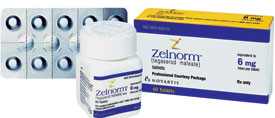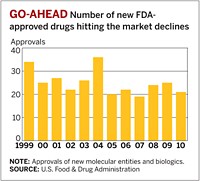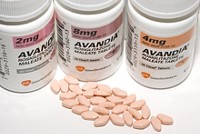Advertisement
Grab your lab coat. Let's get started
Welcome!
Welcome!
Create an account below to get 6 C&EN articles per month, receive newsletters and more - all free.
It seems this is your first time logging in online. Please enter the following information to continue.
As an ACS member you automatically get access to this site. All we need is few more details to create your reading experience.
Not you? Sign in with a different account.
Not you? Sign in with a different account.
ERROR 1
ERROR 1
ERROR 2
ERROR 2
ERROR 2
ERROR 2
ERROR 2
Password and Confirm password must match.
If you have an ACS member number, please enter it here so we can link this account to your membership. (optional)
ERROR 2
ACS values your privacy. By submitting your information, you are gaining access to C&EN and subscribing to our weekly newsletter. We use the information you provide to make your reading experience better, and we will never sell your data to third party members.
Business
Novartis Halts Zelnorm Sales
Makers of a Parkinson's treatment also pull drug from market
by Rick Mullin
April 9, 2007
| A version of this story appeared in
Volume 85, Issue 15
Novartis says it is complying with an FDA request that it suspend U.S. sales of Zelnorm, its irritable bowel syndrome treatment. FDA made the request after a retrospective analysis of clinical trial data indicated a possible link between Zelnorm and incidents of heart attacks and stroke.
FDA approved the drug in 2002. According to the data review, 0.11% of patients taking Zelnorm experienced unusual cardiovascular events, compared with 0.01% of patients treated with a placebo.
"Although we have complied with FDA's request and are collaborating with the agency, we continue to believe that Zelnorm provides important benefits for appropriate patients," says Stephen Cunningham, head of U.S. clinical development and medical affairs at Novartis.
Denise Anderson, head of the health care practice at Zurich-based Landsbanki Kepler, says the impact of the removal may be significant. "The company had highlighted that the drug had blockbuster potential," she notes, adding that analysts had expected Zelnorm to hit $1 billion in sales by 2011. Novartis' sales of Zelnorm last year were $488 million in the U.S. and $73 million in the rest of the world.
Separately, FDA announced that three manufacturers of pergolide drug products, used to treat Parkinson's disease, will voluntarily remove them from the market because of the risk of damage to patients' heart valves. The products involved are Valeant Pharmaceuticals International's Permax and two generic versions of the drug.
FDA has cited adverse side effects in removing several drugs from the market in recent years. Examples include Pfizer's arthritis drug Bextra and Biogen Idec's multiple sclerosis drug Tysabri, both removed in 2005, and Merck's arthritis drug Vioxx, removed in 2004. Regulators cleared Tysabri to return last year with several restrictions.
According to Marvin D. Shepherd, director of the Center for Pharmacoeconomic Study at the University of Texas, Austin, the recalls reflect increased evaluation of postmarket drug safety by FDA. "The industry has to brace itself for more of this," he says. "It is going to haunt them for the next 10 years."





Join the conversation
Contact the reporter
Submit a Letter to the Editor for publication
Engage with us on Twitter